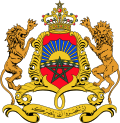Post-colonial relations
Immediately following their independence, a series of "nationalistic prejudices" arose in both Morocco and the then-Kingdom of Tunisia regarding their relationship with France, and both provided support to the National Liberation Front fighting in the Algerian War. [2] Under Habib Bourguiba, Tunisia officially adopted a neutral policy regarding the Western Sahara conflict. [3]
Following the Tunisian Revolution, interim president Moncef Marzouki made an official visit to Morocco in 2012, in part to discuss a re-establishment of the dormant Arab Maghreb Union. [4] King Mohammed VI also visited Tunisia twice in 2014 and 2015. [5] [6] In January 2020, the king and newly-elected President Kais Saied exchanged a phone call. [7]
A diplomatic crisis emerged in August 2022 following a decision made by Saied to invite Polisario Front leader Brahim Ghali, in his capacity as President of the Sahrawi Arab Democratic Republic, to attend the 8th Tokyo International Conference on African Development (TICAD) in Tunis, while also personally receiving him upon his arrival. [8] The Moroccan government subsequently announced that it would boycott the conference, and withdrew its national team from a regional karate championship taking place in Tunis. [8] [9] Both countries also recalled their respective ambassadors. [10] A statement published by the Ministry of Foreign Affairs, African Cooperation and Moroccan Expatriates accused Tunisia of "unilaterally" inviting Ghali "in violation of the process of preparation and established rules", to which Tunisia's Ministry of Foreign Affairs responded that it had "maintained its total neutrality on the Western Sahara issue in line with international law". [10] Following continued criticism from Moroccan media, the Tunisian journalists' union denounced what it had termed a "smear campaign". [8]
This page is based on this
Wikipedia article Text is available under the
CC BY-SA 4.0 license; additional terms may apply.
Images, videos and audio are available under their respective licenses.


